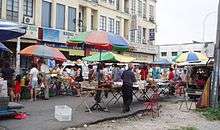Pasar pagi
Pasar pagi (Malay/Indonesian, lit.: "morning market") is a type of traditional market found in Indonesia and Malaysia, quite similar to a wet market.[1]
Operating hours

Pasar pagi mostly operate from early morning to the afternoon.[2] Nevertheless, there is also a related traditional market called pasar malam (lit.: "night market"). The difference between pasar pagi and pasar malam is in its operating hours — pasar pagi opens early in the morning from dawn to the noon every day, approximately from 04:00 to 12:00. While pasar malam opens at night, approximately from 17:00 to 22:00, and only on selected days of a week.
The type of goods being sold is also quite different. Pasar pagi is where many housewives, domestic helps and local folks appear to shop their daily needs, mostly uncook fresh produce. The things which are on sale are usually fresh daily produce, including fruits, vegetables, spices, fish, meat, eggs, and all kinds of daily products. While pasar malam is more to cater a leisurely shopping and eating-out activity, selling ready to eat food, snacks, clothings and various knick-knacks.
Indonesia
In Indonesia, practically all traditional markets are pasar pagi, open from early in the dawn to mid day. Often the stalls are temporarily overflow occupying nearby streets around the marketplace — which normally open for traffic in other hours of the day. They sell fresh produces, such as vegetables, fruits, chicken, meat and fish. The major pasar pagi in Jakarta are Pasar Pagi Mangga Dua, Pasar Induk Kramat Jati, Pasar Minggu and Pasar Senen. Pasar Minggu specialized on fruits and vegetables, while Pasar Kue Subuh in Senen specialized on selling kue, as they offer a rich variety of traditional Indonesian snack, open every subuh (dawn).[2]
Malaysia
In Malaysia, one of the biggest pasar pagi is at Jalan Pasar and Chow Kit area in Kuala Lumpur.[3]
See also
References
- ↑ "Pasar Pagi Cimahi by Mirwan Maulana". World Photo Organisation.
- 1 2 "Weekly 5: Traditional markets around the clock". The Jakarta Post. 19 December 2014.
- ↑ "Chow Kit's lively markets". The Star. 31 October 2014.